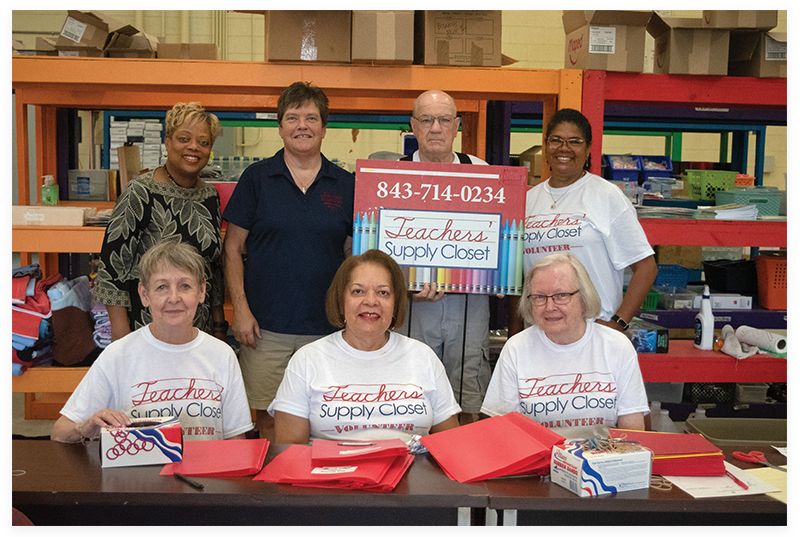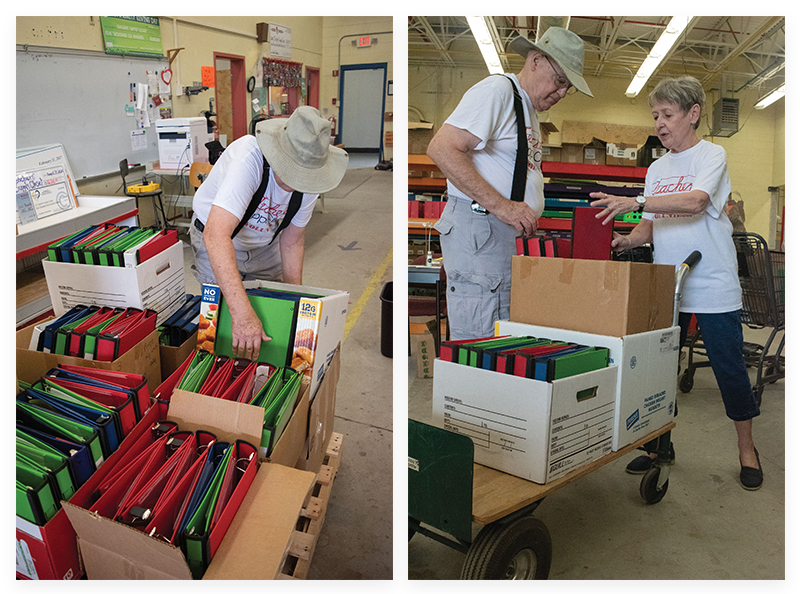Executive director Lynette Duggins is hoping to expand to the Midlands

(Back row, left to right) Executive director Lynette Duggins, administrative assistant Melissa Cox, and volunteers Allan Oliver, Amanda Aldridge, (front row, left to right) Pat Funderburg, Dedra Davis, and Mary Oliver.
Modern schooling may have seen a sharp uptick in technology and digital learning tools, but some educational basics simply don’t change. Two plus two will forever equal four. The letter C invariably follows B. A hypotenuse can always be found using the Pythagorean theorem. And poverty unfailingly influences education. “When kids come to school barely owning shoes, let alone notebooks, when they are surrounded by peers who have them when they have not, that impacts the learning process,” stresses Teachers’ Supply Closet (TSC) executive director Lynette Duggins. “Our mission is to make sure these kids are equipped in the classroom with what they need to keep going.”
A member of the Kids in Need Foundation’s nationwide network, TSC maintains a free supply store for tricounty educators working with families who lack the financial resources to purchase materials such as notebooks, pencils, paper, and backpacks.
Inside TSC’s two-room hub at North Charleston’s Allegro Charter School of Music, wall-to-wall shelves house crayons, glue sticks, hand sanitizers, composition books, paper, gently used textbooks, and other grade-specific resources. With a 2023 budget of $310,000 and $80,000 alloted for school supplies, TSC keeps its closet stocked thanks to partners offering free or at-cost goods, as well as money from corporate sponsors, private donations, and grants.
Rather than supplement classrooms from their own paychecks, eligible tricounty educators can shop the group’s online store twice a year for the supplies necessary to fully engage their students. Regular surveys help the organization hone in on other pressing needs, such as headphones, sanitary napkins, microscopes, and adaptive equipment for special needs students. Much like the drive-up order systems at big-box retailers, volunteers fulfill orders and load teachers’ cars at designated appointment times.

(Left) Volunteer Allan Oliver inspects donated items to make sure they are in good condition. Eligible teachers can order needed materials once a semester; (Right) Volunteers help sort donated school supplies so eligible teachers can order them and pick them up from TSC’s North Charleston hub.
As the only organization of its kind in South Carolina, TSC has provided $8 million worth of supplies to 12,000 educators who reach some 296,000 students. A recent Kids in Need Foundation impact report showed that students who received these items demonstrated an 86.7 percent increase in preparedness. Beyond just being able to complete assignments, the study pointed to a marked improvement in class participation, confidence, and self-esteem, leading to higher grades, stronger peer relationships, and better behavior and attitudes. “Your work is making a difference in the lives of teachers and students,” writes one special education teacher from R. B. Stall High School in a thank-you note shared with donors. In another letter, the principal of Charleston Progressive Academy writes, “The additional materials and supplies help my teachers to provide a continuous quality education to our students.” Given that ace record, TSC’s resourceful executive director wants to graduate beyond the tricounty and is seeking financial and operational support for Richland County.
Growth has been key to TSC since its creation in 2006 by a partnership between the local chapter of The Links, Incorporated, and Jack and Jill of America. At first offering supplies only to schools where nearly the entire student population fell below the poverty line, the nonprofit has worked to broaden its reach. During the most recent academic year, TSC served 58 tricounty schools that met its eligibility requirements—a Title 1 designation and at least 69 percent of the students living under the federal poverty line (indicated by those receiving free or reduced lunch). Beginning this month, the group plans to widen its safety net to include schools where 67 percent or more of the student body falls below the poverty level.
The assignment feels full circle for Duggins, a 61-year-old Charleston native who grew up with a single mother and three siblings. “My family was Title 1, so it’s a passion for me to represent the Teachers’ Supply Closet.”